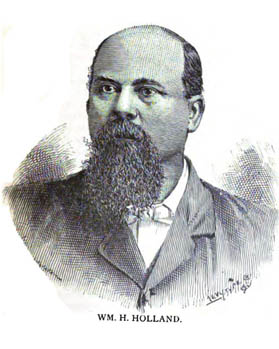William H. Holland
William H. Holland was born a slave in Marshall in 1841. He and his brothers were likely the sons of Capt. Bird Holland, a white man who bought their freedom and moved them to Ohio in the late 1850s. William and his brother Milton attended the Albany Enterprise Academy, a black owned and operated school.
In 1864 Holland enlisted in the Union Army's Sixteenth United States Colored Troops. Holland participated in the battles of Nashville, the Overton Hill campaign, and in the pursuit of John Bell Hood. He also did garrison duty in Chattanooga and eastern and middle Tennessee. His brother Milton enlisted as well, but in the 5th US Colored Troops and won the Medal of Honor for his role in the battle of New Market Heights in 1864.
After the war, Holland attended Oberlin College for two years before returning to Texas and teaching in multiple counties and in many of the city schools of Austin. He was also appointed to a position with the Austin post office.

Image: drawing of William Holland courtesy of Austin History Center, Austin Public Libraries
In 1873 Holland was on the committee at the Colored Men's Convention in Brenahm to discuss support for friendly race relations, a federal civil rights act, open political meetings, black landholding, internal improvements, immigration to the United States, President U. S. Grant and the Republican party, as well as criticism for the violence faced by blacks and efforts to repudiate state debts.
In 1876 he won election to the 15th Legislature as a representative and sponsored the bill establishing the Prairie View Normal College (now Prairie View A&M University).
In 1876 and 1880 he was a delegate to the Republican national convention.
He submitted to the Texas legislature for the establishment of a school for the deaf, mute, and blind in Texas and the Deaf, Dumb, and Blind Institute for Colored Youth was established April 5, 1887 (became part of the Texas School for the Deaf in 1965). Holland was appointed its first superintendent by Governor Ross. His wife, Eliza, joined the school as an instructor in 1890. Holland remained for ten years before being succeeded by S. J. Jenkins, who served until he died in 1904. At that point Holland resumed the position and served until his death in 1907.

